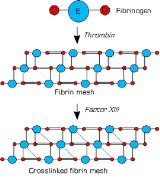
Factor XIII
Overview
Enzyme
Enzymes are proteins that catalyze chemical reactions. In enzymatic reactions, the molecules at the beginning of the process, called substrates, are converted into different molecules, called products. Almost all chemical reactions in a biological cell need enzymes in order to occur at rates...
of the blood coagulation system
Coagulation
Coagulation is a complex process by which blood forms clots. It is an important part of hemostasis, the cessation of blood loss from a damaged vessel, wherein a damaged blood vessel wall is covered by a platelet and fibrin-containing clot to stop bleeding and begin repair of the damaged vessel...
that crosslinks fibrin
Fibrin
Fibrin is a fibrous, non-globular protein involved in the clotting of blood. It is a fibrillar protein that is polymerised to form a "mesh" that forms a hemostatic plug or clot over a wound site....
.
Factor XIII is a transglutaminase
Transglutaminase
Transglutaminases are a family of enzymes that catalyze the formation of a covalent bond between a free amine group and the gamma-carboxamid group of protein- or peptide-bound glutamine. Bonds formed by transglutaminase exhibit high resistance to proteolytic degradation.Transglutaminases were...
that circulates in the plasma as a heterotetramer of two catalytic A subunits and two carrier B subunits. When thrombin
Thrombin
Thrombin is a "trypsin-like" serine protease protein that in humans is encoded by the F2 gene. Prothrombin is proteolytically cleaved to form thrombin in the first step of the coagulation cascade, which ultimately results in the stemming of blood loss...
has converted fibrinogen to fibrin, the latter forms a proteinaceous network in which every E-unit is crosslinked to only one D-unit. Factor XIII is activated by thrombin into factor XIIIa; its activation into Factor XIIIa requires calcium
Calcium in biology
Calcium plays a pivotal role in the physiology and biochemistry of organisms and the cell. It plays an important role in signal transduction pathways, where it acts as a second messenger, in neurotransmitter release from neurons, contraction of all muscle cell types, and fertilization...
as a cofactor
Cofactor (biochemistry)
A cofactor is a non-protein chemical compound that is bound to a protein and is required for the protein's biological activity. These proteins are commonly enzymes, and cofactors can be considered "helper molecules" that assist in biochemical transformations....
.

